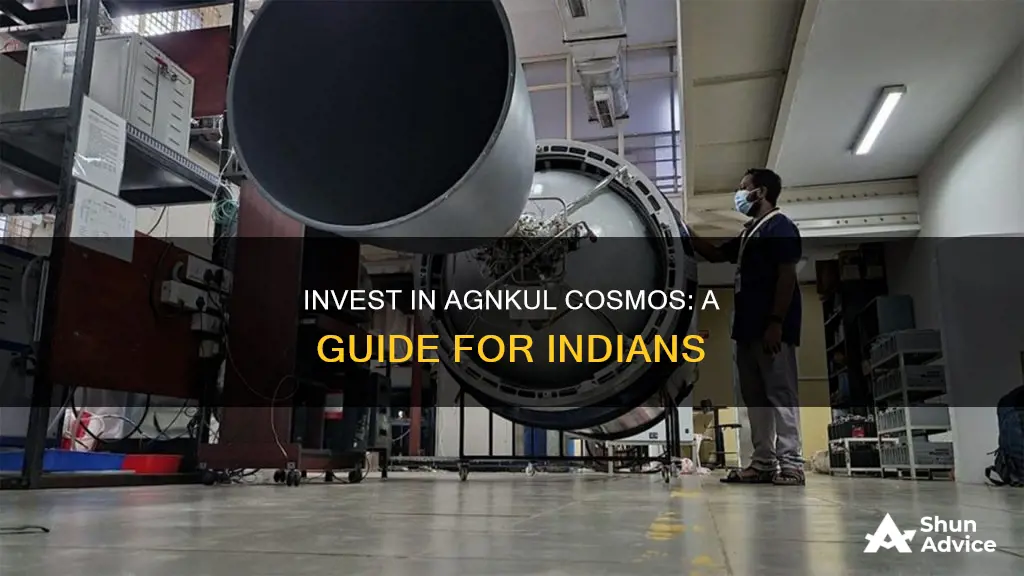
Agnikul Cosmos is an Indian private aerospace manufacturer with bases in Chennai and Sriharikota, Andhra Pradesh. The company was founded in 2017 by CEO Srinath Ravichandran, Moin SPM and Satyanarayanan Chakravarthy. Agnikul aims to develop and launch its own small-lift launch vehicles capable of placing payloads into orbit. The company has raised over $40 million in funding over 8 rounds, with its latest Series B - II funding round raising $6.7 million. Agnikul's success and the opening of the Indian space sector to private players has attracted interest from investors. So, how can interested parties invest in Agnikul Cosmos in India?
What You'll Learn

Agnikul Cosmos' funding and investors
Agnikul Cosmos is an Indian private aerospace manufacturer that designs, manufactures, and launches orbital-class rockets for micro and nanosatellites. The company was founded in 2017 by Srinath Ravichandran, Moin SPM, Satyanarayanan Chakravarthy, and Janardhana Raju within IIT Madras.
Funding and Investors
Agnikul Cosmos has raised a significant amount of funding, indicating strong investor confidence and financial health. The company has come a long way since its seed funding of ₹3 crore (equivalent to ₹4.2 crore or $500,000 in 2023). By the end of 2020, the company had raised almost $4 million.
In October 2023, Agnikul raised $26.7 million in a Series B funding round, bringing its total funding since its inception to $40 million. This funding round was participated in by both existing and new investors. Prior to this, the company had raised up to ₹23.4 crore (equivalent to ₹28 crore or $3.3 million in 2023) from investors.
One notable investor in Agnikul Cosmos is Anand Mahindra, chairman of the Mahindra Group, who has invested in his personal capacity. Java Capital is another investor that has shown strong support for the company, investing in both the early stages and the recent Series B funding round.
The company's successful funding rounds and increasing revenue (a 32% increase to Rs 2.9 crore by the end of March 2023) suggest that Agnikul Cosmos is expanding its capabilities and market presence in the space sector.
Portfolio Optimization: Strategies for Maximizing Returns
You may want to see also

The company's valuation
Agnikul Cosmos Private Limited is a private Indian aerospace manufacturer. The company was founded with seed funding of ₹3 crore (equivalent to US$500,000 in 2023). By the end of 2020, the company had raised almost $4 million and sought the advisory of the Indian Space Research Organisation (ISRO).
Agnikul Cosmos has not disclosed its latest valuation. However, according to the startup data intelligence platform, TheKredible, the company was valued at around $180 million during its Series B round in October 2023. This round of funding, led by Celesta Capital and Rocketship.vc, raised $26.7 million, bringing the total capital raised by the company to $40 million.
The company's co-founder and CEO, Srinath Ravichandran, stated that the valuation was higher than that of previous fundraising rounds. Agnikul's investors include Mayfield, Artha Venture Fund, Pi Ventures, Speciale Invest, and Java Capital.
In addition to its funding from venture capital firms, Agnikul Cosmos has also received investment from Anand Mahindra, chairman of the Mahindra Group, although the amount was not disclosed.
Agnikul Cosmos' main products include a customizable vehicle to launch satellites into space, called "Agnibaan", and a mobile launch platform built on a repurposed truck, called "Dhanush". The company's technology enables quick and affordable on-demand launch capabilities for small and micro-satellites.
The company's extensive expertise in aerospace engineering, combined with its experience in finance and the backing of ISRO advisors, has made it an attractive investment opportunity. The demand for small satellites for various purposes, including earth observation and communication, has increased, creating a potential market for Agnikul's launch capabilities.
With regulatory support in India and cost-effective engineering, Agnikul Cosmos is well-positioned to become a prominent space-faring company in the country and globally.
China's Tech Grip on India's Investment Scene
You may want to see also

The rocket launch process
Agnikul Cosmos has been working on developing and launching its own small-lift launch vehicle, capable of placing a payload of 100 kg into a 700 km orbit. The rocket, named Agnibaan, is an 18-metre-long launch vehicle with a diameter of 1.3 metres and a lift-off mass of 14,000 kg.
The first step in the rocket launch process is the design and manufacturing of the rocket. Agnikul Cosmos has utilised 3D printing technology to create a single-piece rocket engine, doing away with the need for thousands of individual parts. This technology enables the company to conduct near on-demand launches, allowing for customer-centric launches with preferred orbits.
Once the rocket is designed, manufactured, and tested, the next step is the launch itself. Agnikul Cosmos inaugurated India's first private launchpad and mission control centre at the Satish Dhawan Space Centre in Sriharikota, Andhra Pradesh. The launchpad can handle liquid-stage launch vehicles, and both the launchpad and mission control centre have a high degree of redundancy built into their critical systems to ensure full operational capability.
During the launch, the rocket ignites its engines and lifts off. Seven seconds after lift-off, autopilot is engaged, and the rocket begins to execute its intended course. Around 60 seconds into the flight, the rocket enters a wind biasing manoeuvre. The rocket continues flying until it burns out and falls back to Earth.
Following a successful launch, the rocket will carry its payload, in this case, micro and nanosatellites, to the specified orbit. This is facilitated by Agnibaan's clustered engines on the first stage, which can be configured based on the payload requirements. The rocket uses LOX and Kerosene-based engines.
Investment Decision-Making: Financial Management Strategies Explained
You may want to see also

The company's history
Agnikul Cosmos Private Limited is an Indian private aerospace manufacturer based in the National Centre for Combustion Research and Development (NCCRD) of IIT Madras, Chennai. The company was founded in 2017 by CEO Srinath Ravichandran, a former Wall Street trader-turned-aerospace engineer, operations specialist Moin SPM, and Satyanarayanan Chakravarthy, a professor at IIT Madras. With seed funding of ₹3 crore (equivalent to US$500,000 in 2023), Agnikul aimed to develop and launch its first rocket in 2021. The company subsequently raised up to ₹23.4 crore (US$3.3 million in 2023) from investors, including Anand Mahindra, chairman of Mahindra Group.
In 2020, Agnikul entered an agreement with the Indian Space Research Organisation (ISRO), granting them access to the space agency's expertise and facilities. The startup also signed a framework agreement with the Department of Space in September 2021 for access to ISRO facilities and technical expertise for the development of its two-stage small-satellite Agnibaan launch vehicle.
In October 2023, Agnikul raised $26.7 million in a Series B funding round, bringing its total funding to $40 million. The company has developed and successfully tested its semi-cryogenic rocket engine, Agnilet, which will power the second stage of its rocket Agnibaan. Agnilet is unique in that it is manufactured as a single piece through 3D printing with no assembled parts.
Agnikul Cosmos inaugurated India's first private launchpad and mission control centre at the Satish Dhawan Space Centre in Sriharikota, Andhra Pradesh, in November 2022. The company's first commercial launch was expected in 2022, with the first suborbital test vehicle successfully launched on 30 May 2024. This mission achieved several milestones, including the world's first flight with a single-piece 3D-printed engine and India's first semi-cryo engine launch and private launch pad launch.
Investing in Apollo Global Management: A Comprehensive Guide
You may want to see also

The team behind the company
The team behind Agnikul Cosmos is comprised of rocket scientists, engineers, ex-bankers, and space lawyers, a blend that the company considers one of its biggest strengths. The company was founded by Srinath Ravichandran, Moin SPM, Satyanarayanan Chakravarthy, and Janardhana Raju within IIT Madras. Ravichandran is the CEO and has an extensive educational background in finance, aerospace, aeronautical, and astronautical engineering. He previously worked on Wall Street but left to pursue his true passion of space exploration. Moin SPM, another co-founder, has a background in contract manufacturing for perfumes and an MBA in Aerospace Science and Technology.
The company has strong backing from advisors such as Perumal, ex-ISRO, and Prof. SR Chakravarthy, Head of the National Combustion Labs, with an advisory board of 10+ ex-ISRO scientists. The company's unique mix of space expertise and motivation has made it an attractive investment opportunity.
ESG Investing: Portfolio Value and Long-Term Impact
You may want to see also
Frequently asked questions
Agnikul Cosmos Private Limited is an Indian private aerospace manufacturer based in the National Centre for Combustion Research and Development (NCCRD) of IIT Madras, Chennai. The start-up develops and launches its own small-lift launch vehicles capable of placing payloads into orbit.
Agnikul Cosmos is a private limited company. As such, it is not possible to invest directly in the company by purchasing shares on a stock exchange. However, Agnikul Cosmos has raised funding through several rounds of venture capital funding. To date, the company has raised around $40 million in funding over 8 rounds, with 22 investors in total.
Agnikul Cosmos aims to perfect the technology of firing multiple engines at once and to conduct experiments for stage separation following the success of the Agnibaan SOrTeD mission. The company is constructing rigs, which will take around six to seven months, with the first orbital launch planned for three months after their completion. The company also plans to launch its rocket, Agnibaan, on a commercial mission in 2024-25.







